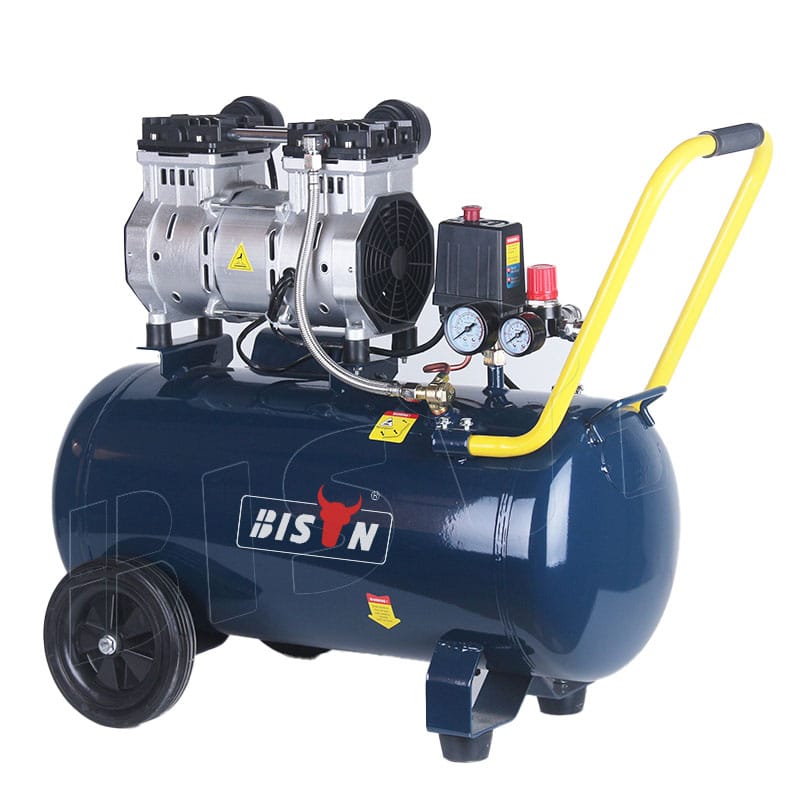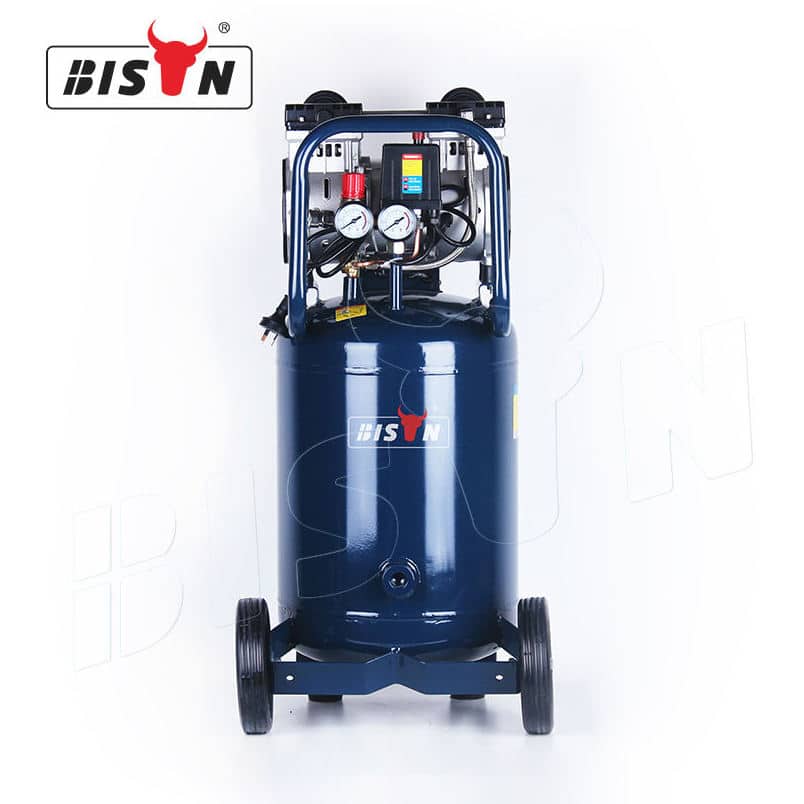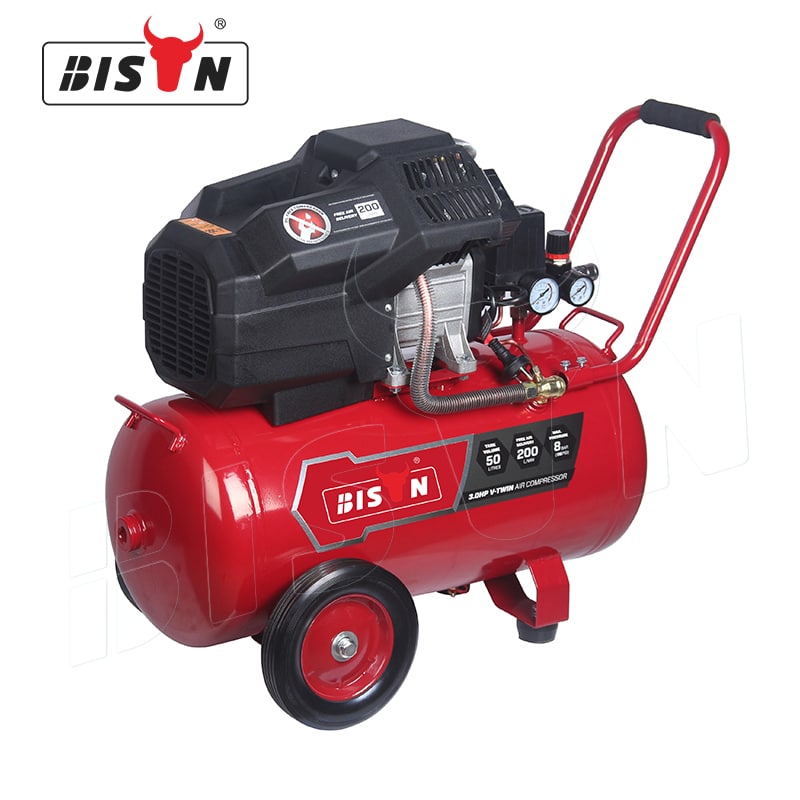oil free air compressor manufacturer




China oil free air compressor just for you
Have Peace of mind with BISON oil-free compressors
You will have peace of mind that your production has zero risk of contamination.
Our oil-free compressors are reliable and compact, ensuring ease of use and maintenance. Pharmaceuticals, food and beverages, electronics, and textiles are just a few of the industries that operate with oil-free air. Our oil-free compressors are ISO 9001 certified.
contact us and Start oil free air compressor business
oil free air compressor manufacturer & supplier
BISON are a leading manufacturer and supplier of oil-free air compressor in China. Our range of oil free air compressors are made from high quality components to ensure best performance. We also provide customised products as per the requirements of our clients. Our team of quality analysts test these products on various parameters before final dispatch.
Applications and uses of oil-free compressors
Some industries and applications where oil-free compressors have many advantages and are often used include:
Found something interesting ?
An in-depth guide you should read before purchasing oil-free air compressor
What is oil-free air compressor?
Oil-free air compressors do not use any lubrication in the compression chamber. Instead, these compressors use alternative materials such as Teflon coating or water with the aim to protect the pump and enable the mechanism to move smoothly without any oil-based or synthetic lubrication.
Oil-free air compressors are the ultimate solution for compressed air applications where meeting the highest air purity standards is critical.
Oil Free Air Compressors: Class 0 and technically oil-free air
In the air compressor market, you’ll encounter the terms Class 0 and “technically oil-free”, both used to identify how clean the compressed air is. Compressors are ranked according to the International Organization for Standardization (ISO), which sets global standards for proprietary, industrial and commercial purposes.
There are ISO standards for compressed air. Depending on the final air purity, compressors can be graded from ISO class 0-5, with class 0 being the best.
Class 0 oil-free compressors guarantee 100% oil-free air. While their initial price may be higher, these compressors are safer for sensitive applications and are the cleanest option since your final product will not be contaminated.
“Technically oil-free” compressors are susceptible to contamination because they are actually lubricated compressors with oil-removing filters. These compressors are listed as ISO Class 1.
How do oil-free air compressors work?
The air compressor works on a very simple principle. That is, whenever air is compressed, its volume decreases which results in an increase in pressure. Both, oil-free and oil-injected air compressors work in the same way. Air compression is simply a two-stage process in which when air pressure rises, volume falls. However, there are different oil-free air compressor technologies that work in different ways:
Oil-free rotary screw compressors
The external gear synchronously rotates the screw elements in opposite directions. As the rotors don’t touch and generate friction, no lubrication is needed in the compression chamber. That’s why there’s no oil in the compressed air. Because of precision within the enclosure, it minimizes pressure leaks and drops from the pressure side to the inlet. And since the internal pressure ratio is limited by the difference in air temperature between the intake and exhaust ports, oil-free screw compressors typically employ multistage and interstage cooling to maximize the pressure range. The drive mechanism’s gearbox does contain lubricant; oil-free means the compression chamber itself, and the air being delivered is free of extraneous contaminants beyond those inherent in the air passing through the intake.
Oil-free piston compressor
A traditional piston compressor has a crankshaft, connecting rods and pistons, cylinders, and valve heads. At the top of the cylinder, there’s a valve head that houses the intake and exhaust valves. Both are simple thin metal flaps, one mounted under the valve plate and the other on top of the valve plate. As the piston moves down, vacuum forms over it. This allows outside air which is at atmospheric pressure to push open the intake valve and fill the area above the piston. When the piston moves up, the air above it is compressed, keeping the intake valve closed and pushing the exhaust valve open. Air moves from the discharge port into the tank. With each stroke, more air enters the tank, and the pressure rises. Oil-free piston compressors do not inject oil into the compression chamber, but instead, have Teflon-coated rings.
Oil-Free Scroll Compressor
A single spiral rotor oscillates against a similar fixed spiral, and as these spirals move against each other, the cavities between them that trap air become progressively smaller. This reduction in volume forces the fixed volume of intake air pressure to increase.
Why choose an oil-free compressor?
In many sectors, the purity of air is of utmost importance. A minute amount of oil can lead to product degradation or harm production machinery. Hence, it’s essential to contemplate your manufacturing process and the final product when selecting an air compressor. An increasing number of companies are turning to oil-free air compressors as a reliable means of delivering uncontaminated compressed air.
Oil-free compressors employ a variety of technologies that eliminate the need for oil. While oil lubricated compressors use oil in the compression chamber for cooling and sealing purposes, oil-free compressors, regardless of the technology used, never use oil in the compression chamber. This eradicates the chance of contamination, guaranteeing 100% air purity!
Beyond the entirely risk-free operation, there are several key advantages to choosing an oil-free compressor:
Cost-Efficient Ownership: Save on expenses related to oil replacements and equipment used to separate and clean oil from air, such as oil separators, filtration devices, and condensate treatment.
Eco-Conscious Choice: Oil-free compressors comply more with international environmental standards compared to lubricated systems, making them an eco-friendly compressor choice.
Minimal Maintenance: The absence of oil and fewer moving parts result in less maintenance and fewer potential problem areas.
Certified Air Quality: All Bison air compressors adhere to either ISO Class 1 or ISO Class 0 air purity standards.
Quiet Operation Thanks to the limited number of moving parts, they generate less noise pollution and vibration.
Common oil-free compressor misconceptions
People use some rumors to discredit oil-free air compressors. Let’s discuss these misconceptions and know what the truth is.
a) Oil-free compressors are noisy
We cannot deny that oil-free compressors used to be much noisier than traditional oil-lubricated compressors. However, modern oil-free compressors are not as loud as one might think. Today’s oil-free compressors like BISON oil-free compressors feature direct drive, dual-piston pumps, and noise reduction technology so noise is no longer an issue.
b) Oil-free compressors have a shorter lifespan
The biggest argument against oil-free compressors is their relatively short life expectancy. Again, this may have been the case in the past, but today’s oil-free compressor life is no longer an issue.
Significant advances have been made in oil-free technology, allowing oil-free compressors to run cooler and last longer. Also, they require less maintenance than oil compressors. However, you may have to replace the air end on an oil-free compressor before replacing the air end on a well-maintained oil-flooded compressor. BISON oil-free compressors are designed in such a way that they can work longer and require less maintenance.
c) Oil-free compressors run hotter
While oil does act as a heat transfer material and keeps the compressor cool, the dual-pump design of oil-free compressors allows them to achieve the required CFM/PSI at half the revolutions of oil compressors.
Oil-free technology is popular in many industries where compressed air needs to meet stringent health, safety, and air quality standards. The oil-free design is ideal for businesses that need to ensure no product spoilage due to contaminated air output.
BISON’s Reliable oil-free compressors
BISON’s oil-free air compressors are the best way to ensure oil-free air for critical processes. With our oil-free air compressors, you can look forward to increased efficiency and lower energy costs.
If you want to wholesales oil free air compressors, contact us right now.
oil free air compressor FAQs
How long can an oil-free compressor last?
As a general rule of thumb, an oil-free compressor will not last as long as an oil-lubricated compressor, as its pre-lubrication will wear out and degrade over time. Oil-free compressors also tend to use universal motors, which don't last as long as induction motors.
The Teflon coating which is typically used to lubricate the internal cylinders wears over time. This wear can increase when oil-free compressors are used in extreme temperatures or for extended periods of time. Oil-free compressors can last for years if you're vigilant, but that takes more time and money than oil-lubricated air compressors.
If you want to increase the life of your oil-free compressor, good maintenance is the only option that you have. There are many moving parts in air compressors that can cause heavy wear, so you should check the inside at least once or twice a month. Check for permanently lubricated elements such as the cylinder's Teflon coating and Teflon or carbon ring seals.
Oil-free vs oil-injected air compressors
The best air compressor for your facility will depend on where it has to be used. Oil-free compressed air is a must for many applications where oil contamination can damage production equipment or cause product spoilage and recalls. These compressors can help your process meet the highest air purity standards.
Look at the following considerations if you face difficulty in deciding between oil-free and oil-injected air compressors.
- Air Quality
- Noise levels
- Energy usage
- Environmental Impact
Oil-injected air compressors may be a more cost-effective option for applications that do not require the above advantages to increase efficiency or maintain safety. In contrast, oil-injected compressors generally have a more durable design and last longer than oil-free models.
Table of Contents
Explore Our Properties
This is a detailed guide on air compressors. You’ll find everything you need to know about air compressors. Let’s get started.



















